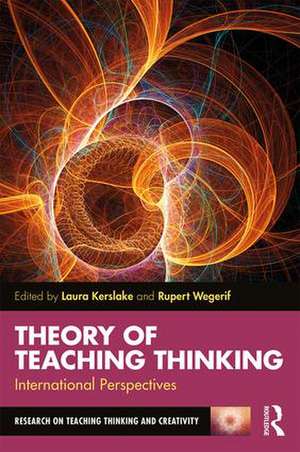Theory of Teaching Thinking: International Perspectives: Research on Teaching Thinking and Creativity
Editat de Laura Kerslake, Rupert Wegerifen Limba Engleză Paperback – 12 apr 2018
Theory of Teaching Thinking discusses what is meant by ‘thinking’ in the context of teaching and takes a global perspective incorporating contributions from neurocognitive, technological, Confucian, philosophical, and dialogical viewpoints.
Questions explored throughout this edited volume include:
- what is thinking?
- how can thinking be taught?
- what does ‘better thinking’ mean, and how can we know it if we see it?
- what is the impact on wider society when thinking is taught in the classroom?
| Toate formatele și edițiile | Preț | Express |
|---|---|---|
| Paperback (1) | 348.51 lei 43-57 zile | |
| Taylor & Francis – 12 apr 2018 | 348.51 lei 43-57 zile | |
| Hardback (1) | 998.08 lei 43-57 zile | |
| Taylor & Francis – 17 apr 2018 | 998.08 lei 43-57 zile |
Preț: 348.51 lei
Nou
Puncte Express: 523
Preț estimativ în valută:
66.69€ • 69.81$ • 55.18£
66.69€ • 69.81$ • 55.18£
Carte tipărită la comandă
Livrare economică 07-21 aprilie
Preluare comenzi: 021 569.72.76
Specificații
ISBN-13: 9781138297906
ISBN-10: 1138297909
Pagini: 180
Ilustrații: 1 Line drawings, black and white; 1 Tables, black and white
Dimensiuni: 156 x 234 x 20 mm
Greutate: 0.27 kg
Ediția:1
Editura: Taylor & Francis
Colecția Routledge
Seria Research on Teaching Thinking and Creativity
Locul publicării:Oxford, United Kingdom
ISBN-10: 1138297909
Pagini: 180
Ilustrații: 1 Line drawings, black and white; 1 Tables, black and white
Dimensiuni: 156 x 234 x 20 mm
Greutate: 0.27 kg
Ediția:1
Editura: Taylor & Francis
Colecția Routledge
Seria Research on Teaching Thinking and Creativity
Locul publicării:Oxford, United Kingdom
Cuprins
Introduction Laura Kerslake and Rupert Wegerif 1. A recent history of teaching thinking Steve Higgins 2. Emotions: can’t think with them, can’t think without them Doug Newton 3. Thinking beyond rationalism Emma Williams 4. Philosophy with Children from pragmatism to posthumanism: thinking through the Community of Philosophical Inquiry Laura Kerslake 5. Fixing Humpty-Dumpty: putting higher-order skills and knowledge together again Carl Bereiter and Marlene Scardamalia 6. A dialogic theory of teaching thinking Rupert Wegerif 7. Learning to think collectively: a response to the wicked problems of our times Valerie A. Brown 8. A Confucian perspective on developing thinking skills Li Li 9. An outline of assessment in humanistic conversations: definitions, aims and design Benzi Slakmon and Baruch B. Schwarz 10. Theory and the evaluation of teaching thinking Bob Burden and Steve Higgins
Notă biografică
Laura Kerslake is a philosophy lecturer currently conducting research into Philosophy with Children at the University of Cambridge. She is the creator of the Philosophize project, and has wide experience of teaching thinking in education from Early Years to Higher Education.
Rupert Wegerif is a professor of education at the University of Cambridge. He has written several books and many research articles on teaching thinking and educational theory. He is co-director of the Cambridge Educational Dialogue Research Group (CEDiR) and founder and co-convenor of the Educational Theory Special Interest Group of the European Association for Research on Learning and Instruction.
Rupert Wegerif is a professor of education at the University of Cambridge. He has written several books and many research articles on teaching thinking and educational theory. He is co-director of the Cambridge Educational Dialogue Research Group (CEDiR) and founder and co-convenor of the Educational Theory Special Interest Group of the European Association for Research on Learning and Instruction.
Descriere
Across the world education for ‘thinking’, or ‘21st Century Skills’ or ‘Creativity’ is seen as the key to thriving in the Internet Age. This book provides a much needed introduction and guide to this critical subject. The OECD suggest teaching thinking as key to growing a more successful economy, others claim it is needed for increased democratic engagement and well-being. Teaching for Thinking and Creativity questions what we mean by ‘thinking’ or ‘creativity’in the context of teaching and takes a global perspective incorporating contributions from neurocognitive, technological, Confucian, philosphical and dialogical perspectives.


